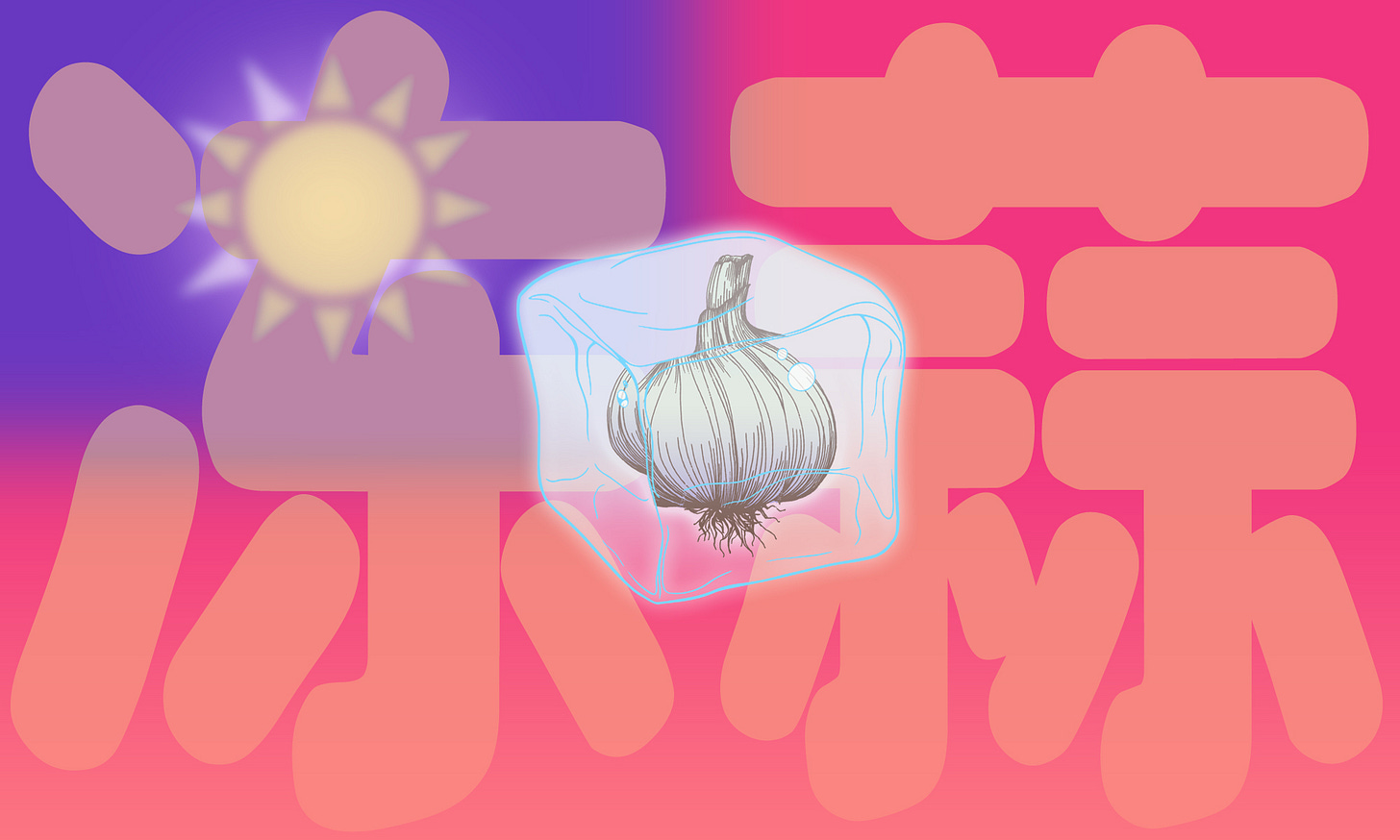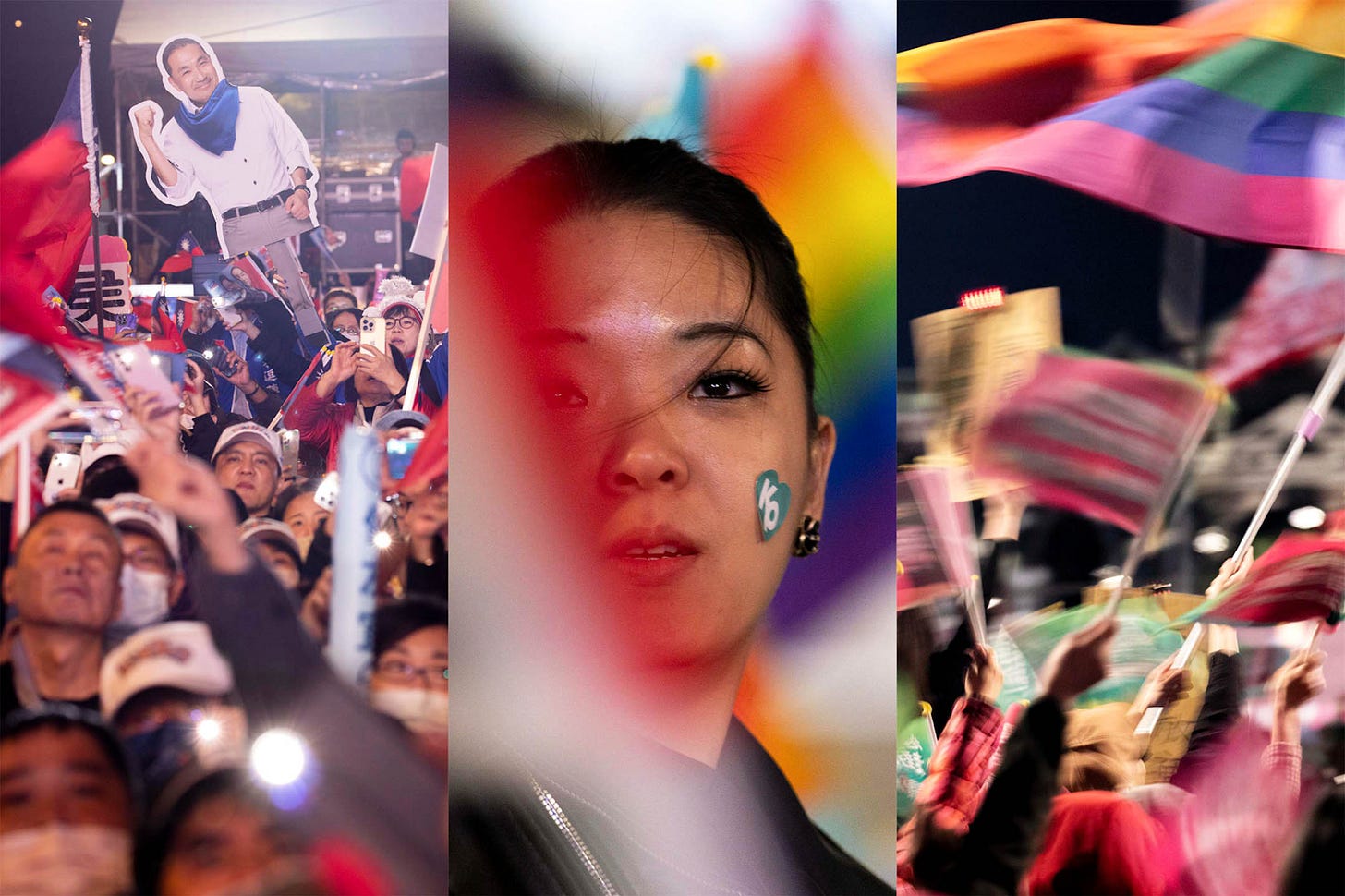Welcome to RealTime Mandarin—a multimedia resource to immerse you in the latest Chinese language trends, inspire you to practice and improve your Mandarin every week, and empower you to communicate with confidence.
Subscribe now to get the next issue straight to your inbox!
Last weekend, people in Taiwan voted for Lai Ching-te (赖清德 Lài Qīngdé) to be their next president, ushering in an historic third term in power for the Democratic Progressive Party (民进党 mínjìndǎng), the DPP. Lai secured 5.58 million votes, 40% of the vote.
Hou Yu-ih (侯友宜 Hóu Yǒuyí) of the KMT (国民党 guómíndǎng), came second with 4.67 million people voting for him, or 33.49% of the vote.
Ko Wen-je (柯文哲 Kē Wénzhé) of the People's Party (民众党 mínzhòngdǎng), took 3.69 million votes, 26.46% of the total. The relatively new party was founded four years ago by Ko, as a "rational" alternative to the other two main parties, with a greater focus on domestic concerns.
The turnout was 71.86%, slightly lower than 74.9% four years ago, but an increase of 5.59% compared to 2016.
Taiwan’s democracy is as vibrant, loud, and proud as ever.
Although it's not quite as dangerous as it used to be.
When I lived in Tainan in 2004, the then President, Chen Shui-bian (陈水扁 Chén Shuǐbiǎn), or 阿扁 ā biǎn as he was known, was shot while campaigning in Tainan, the day before Taiwan's election, on 19 March that year. Chen survived and went on to win by 29,500 votes.
Now, back to 2024!
Some of the language used around the election is uniquely Taiwanese. With one phrase in particular capturing the sentiment:
Whether it’s at the site where candidates register for election, sweep the streets to solicit votes, or hold large-scale rallies, the shouts of "frozen garlic" can be heard with flags printed with the candidates' faces and names flying.
The phrase, “frozen garlic”, connects candidates and voters, bringing them together as a community. As the campaign enters the final stage of close combat, “frozen garlic” is not just a message of confidence, but also a conviction that must be firmed up in the final fierce confrontation that is accompanied by all the negatives in the campaign.
无论是在候选人登记参选的现场、扫街拜票、或是举办大型选举造势活动,“冻蒜”的喊声大多随著印有候选人头像与姓名的旗帜震荡飘扬,“冻蒜”将候选人与选民连结起来,作为选举共同体。也随著选战进入最终近身肉搏阶段,冻蒜不只是信心喊话,更像是在最后的激烈对抗伴随著一切的负面选战中,必须坚定的信念。
Originally borrowed from Hokkien (闽南话),"frozen garlic" is a rallying cry of support for candidates to "get elected" - a phrase that sounds similar in Taiwanese and Mandarin.
The term “frozen garlic” was blocked on mainland social media sites hours after the results were announced because it was used as a search term following the censoring of "Taiwan election" (台湾大选) from search results.
The characteristics of Taiwanese democracy go beyond language. Chinese religion, culture, and superstitions are also intertwined into the campaigning process:
With faith as a spiritual culture, candidates go to palaces and temples to worship and to secure votes in the local areas. They hold three sticks of incense in their hands to pray to heaven and earth, initiating a dialogue that connects people and gods. With the incense, they also pay "respect to the people", showing their piety towards local beliefs. The curling smoke rises to connect people and places, allowing the candidates to identify with the neighbourhoods. [1]
而信仰作为精神文化,前往宫庙拜庙,也在地方进行固票;候选人手上燃着的三炷香,除敬天、敬地,连结了人与神的对话,也“敬人”,彰显候选人对地方信仰的虔诚,袅袅烟灰通往的是人与地方,连结了候选人与在地的认同。[1]
So that's what we are exploring this week!
Favourite Five
1. 冻蒜 dòng suàn
get elected!
无论是在候选人登记参选的现场、扫街拜票、或是举办大型选举造势活动,“冻蒜”的喊声大多随着印有候选人头像与姓名的旗帜震荡飘扬 - Whether it’s at the site where candidates register for election, sweep the streets to solicit votes, or hold large-scale rallies, the shouts of "frozen garlic" can be heard with flags printed with the candidates' faces and names flying. [1]
Background: Direct translation is “frozen garlic,” a homonym from Hokkien (pronounced tòng-suán), which sounds the same as the word for “get elected” (当选).
2. 车拚 chē pàn
fierce competition
最后压轴登场的赖清德,历经选前最后一周的造势车拚,以沙哑的声音向支持者喊话 - Lai Ching-te, who appeared last as the most important speaker, shouted to supporters with a hoarse voice as a result of a week of intensive campaigning. [2]
More: Another Taiwanese phrase. 拚 would be written as 拼 (pīn) in Mandarin.
3. 魔咒 mó zhòu
curse; a spell
成功破除台湾民主化以来,单一政党无法连任第三任期的魔咒 - Lai successfully broke the curse that no single party managed to be re-elected for a third term since Taiwan's democratisation., [3]
4. 朝小野大 cháo xiǎo yě dà
minority government
在赖清德当选后的政治板块,将是朝小野大的政局 - In the political landscape after Lai Ching-te's election, the opposition outnumbers the government.[3]
Background: 朝 cháo, dynasty, here means the ruling party; 野 yě is the opposition.
Related :
朝野 cháo yě - political circles, both the ruling party and the opposition
5. 青天白日满地红 qīng tiān bái rì mǎn dì hóng
the flag of the Republic of China
支持者挥舞青天白日满地红的中华民国国旗,现场旗海飞扬 - Supporters waved the flag of the Republic of China, featuring blue sky, white sun, and a field of red, creating a scene of fluttering flags. [2]
More: A description of what Taiwan's flag looks like: Blue sky, white sun, and a field of red.
Consuming the Conversation
Useful words
6. 党魁 dǎng kuí
party leader
现任党主席朱立伦在受媒体询问是否为因为败选辞去国民党党魁一职,朱立伦并未回复 - The current party chairman, Chu Li-lun, did not respond when asked by the media whether he would resign as the leader of the Kuomintang due to the defeat. [3]
7. 民意 mín yì
public opinion
我们并不完美,但我们一定要做最能回应民意的政党 - We are not perfect. But we should aim to be the political party that can best respond to public opinion. [3]
8. 拜票 bài piào
canvassing for votes
大选期间,候选人走进巷弄、弯进市场、在夜市拜票 - During the campaign period, candidates visited neighbourhoods, markets and night markets to canvass for votes. [1]
Note: A very Taiwanese expression. 拜 here means 拜访.
Related:
拉票 lā piào - canvassing for votes (more common on the mainland)
固票 gù piào - secure votes (Taiwan-specific phrase)
唱票 chàng piào - announcing votes
9. 簇拥 cù yōng
surround to show support; to flock around
台下选民簇拥着候选人走上数十分钟使抵达舞台 - It took the candidate over ten minutes to reach the stage, as voters below surrounded him to show their support. [1]
10. 声势 shēng shì
momentum; influence
假若人潮蔓延满过景福门,便会被视为声势惊人 - If the crowd extends beyond the Jingfu Gate, it will be seen as an astonishing momentum. [2]
Related:
声浪 shēng làng - sound waves; roar of the crowd
11. 阵营 zhèn yíng
camp; faction; political grouping
凯道的路权则由民进党阵营拿下 - The right of way on Ketagalan Boulevard was secured by the Democratic Progressive Party (DPP) camp. [2]
Related:
蓝营 lán yíng - "Blue Camp" KMT
绿营 lù yíng - "Green camp" DPP
白营 bái yíng - "White camp" TPP
12. 抹红 mǒ hóng
smear with red; to discredit as a CCP apologist
不管民众党、柯文哲、怎么污辱我、糟蹋我、抹红我,我一句坏话都没说 - No matter how the People's Party or Ko Wen-je insults me, mistreats me, or tries to discredit me as a CCP apologist, I haven't said a single bad word. [2]
Three-character phrases
13. 擂台战 lèi tái zhàn
showdown; decisive battle















